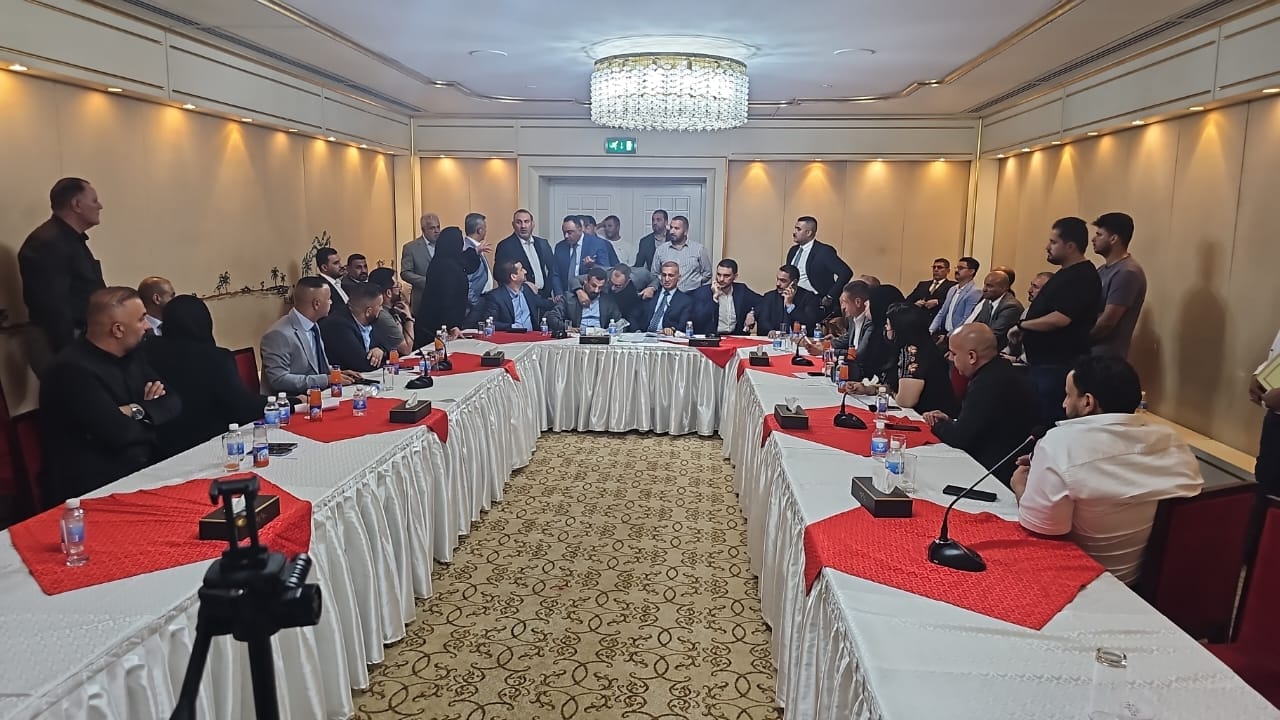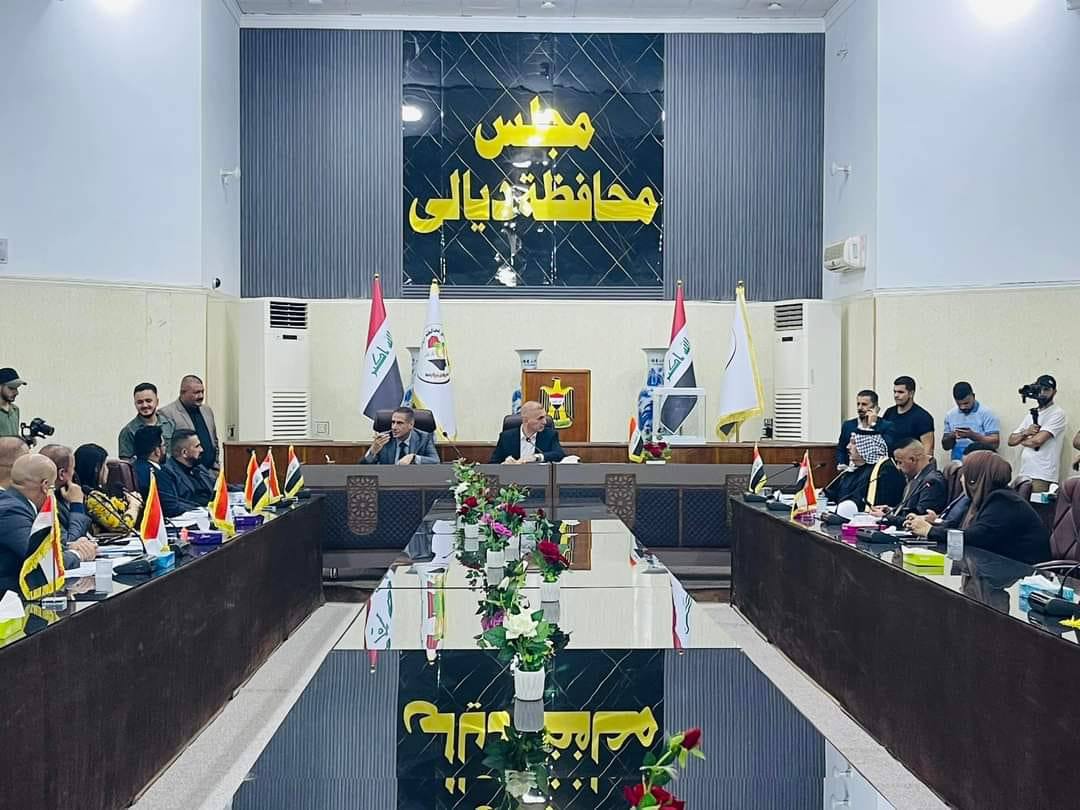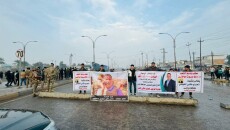The Diyala provincial council has finally resumed its regular sessions after 179 days of debate and a turbulent night in Baghdad, during which the foundations of the formation of a local government were laid.
The regular session of the council was held on Sunday, August 4, in Baquba, the capital of Diyala province, to discuss the priorities of their work, including the rules of procedure and review of administrative posts.
"There are many issues to be resolved by the provincial council. This was the third session of the council and the first session after the vote on the local government," Omar Krui, chairman of the provincial council, told KirkukNow.
The first session of the council after the elections was held on February 5, but due to disputes between different factions, it remained open until Thursday, August 1, at the Rashid Hotel in Baghdad, and ended with the decision of the posts of speaker and deputy speaker.
Adnan Shamari was elected as the candidate of the Rule of Law coalition the governor outside the council, while Omar Krui of the Sovereignty (Siyada) coalition was elected as the speaker of the council. Mustafa Lahebi of the Taqadum faction and Saleem Tamimi, the candidate of Asaib al-Haq AAH, were elected as the deputy speakers.
The meeting was attended by 11 out of 15 members of the council. Muthana Tamimi, former governor of Diyala, who received the most votes, and three other members of his faction and other factions were not present. His supporters have shut provincial council office while the meeting was ongoing in Bghdad.
On the eve of the protests, Muthana Tamimi announced on his Facebook page that he would not attend the meeting on the formation of the Diyala government in response to his tribe's demands.
Tamimi, who won more than 100,000 votes and four council seats from the pro-Shiite Badr faction, had been insisting on regaining the governor's post for months.
The meeting was attended by Turki Atbi, the eldest member of the council, temporary chairman and separatist from the Diyalatuna coalition, Farqad Ruba'i from Diyalatuna, Rashida Dayni, Omar Krui, and Fares Mazahm from Siyada, Rashad Tamimi and Saleem Tamimi from Istihaqaq (AAH). Fadi Lahebi was from Azm, Darya Khayrullah was from the Assas (Base) coalition, and Aws Ibrahim was from the Patriotic Union of Kurdistan PUK.
Those who boycotted were Muthana Tamimi and Raad Hatem of the Diyalatuna coalition, Majida Kambash and Nizar Lahebi of Taqadum.
Aws Ibrahim, a member of the council from the (PUK) faction, told KirkukNow: “I voted for the formation of the local government at the request of my party leadership to participate in the provincial administration.”
It is true we have got no senior position and lost deputy governor but we will not give up our rights and have to be part of local administration
“It is true we have got no senior position and lost deputy governor but we will not give up our rights and have to be part of local administration.”
The 15 members of the Diyala Council were first divided into two teams: The Team of Eight and the Team of Seven. The two teams include a mixture of Shiite and Sunni parties seeking to secure the largest number of senior positions in the local government in their favor.
Diyala Provincial Council consists of 15 seats, four of which are allocated to women. Diyala Governorate is home to 1.6 million people, 90,000 of whom live in the center of the Khanaqin dominantly Kurdish district, according to estimates by the Central Bureau of Statistics for 2019.

The Kurds previously held the posts of deputy governor, district and sub-district mayors, especially in Khanaqin, one of the disputed towns of Diyala.
According to Aws, the Kurds in the negotiations to form the Diyala local administration "discussed and agreed" to the post a mayor, two sub-district mayors, and a general director of the province for the Kurds, along with a number of administrative posts and advisor to the governor.
The Diyala council, which has passed the stage of deciding on senior positions, is looking to review, exchange, and re-elect all positions of heads of administrative units and director generals.
"The issues that the council should investigate include the monitoring of state institutions that have been unmonitored for four to five years," Diyala Council Speaker told KirkukNow, especially those working slowly to take necessary measures.
Only three members were absent from the regular meeting held on August 4 at the council building. Muthana Tamimi and Farqad Rabi'i of Diyalatuna and Majida Kambish of Taqadum. The council has decided to form 24 committees at the next meeting.
The delay in the formation of local governments weakened the oversight power
Diyala Governor Adnan Shamari told reporters after his election that his priorities are to monitor service projects and resolve the issue of employment, which is 7,000 jobs due to the absence of the local government's composition and the lack of signature authority of the acting governor, which had stopped the establishment.
Provincial council elections have been held since December 18, 2023, but only Diyala and Kirkuk were late in forming a new local administration.
“The six-month delay in forming the local government weakened the oversight authority and became an obstacle to projects and employment that young people were eagerly awaiting,” said Saif Ali, a civil society activist in Diyala.
Ali called on the new government via KirkukNow to resolve the issue of employment soon, improve the living conditions of people and provide proper service projects, especially in marginalized areas especially in the districts of Khalis, Uzem, and Habhab.
The main tasks of the provincial council, in addition to monitoring through its standing committees, are to decide on the provincial budget and approve project and service plans.
"The committees will be formed in the coming days, the council will make many changes, including replacing the directors of offices, and in the future, service projects, employment, and follow-up of citizens' demands will resume," said Khayrula, member of provincial council.






